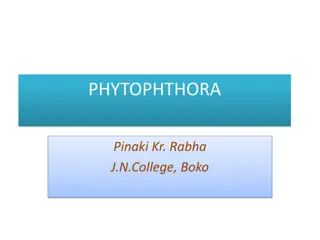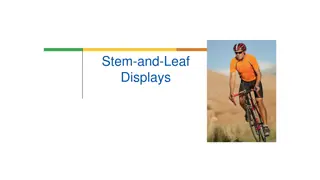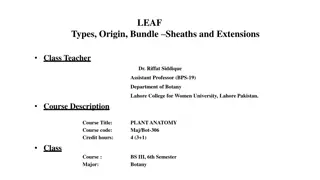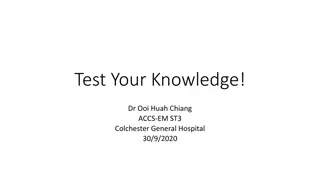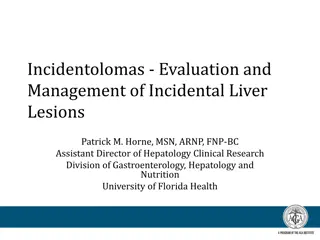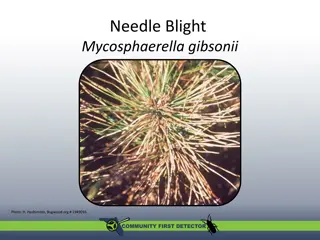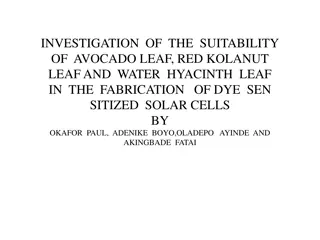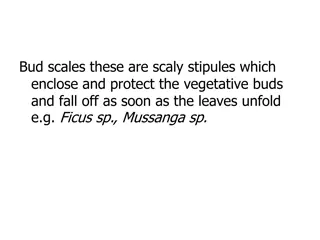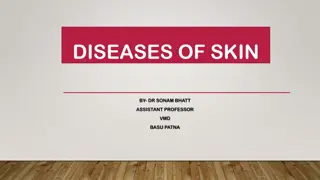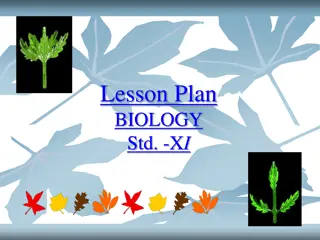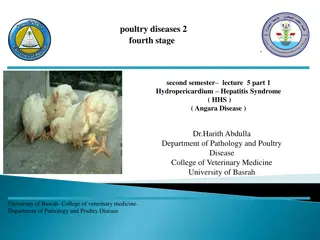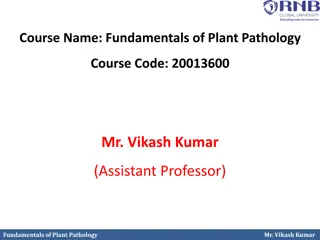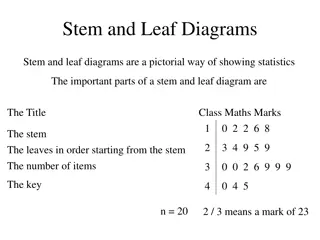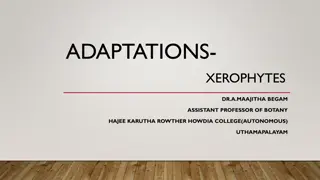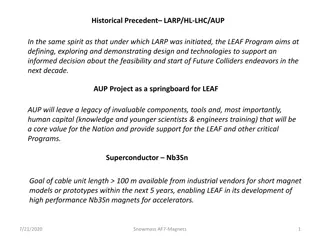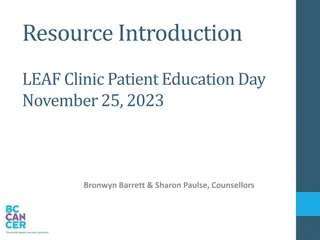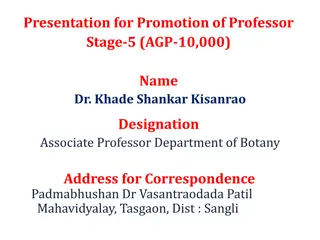Fun Leaf Printing Activity for Identifying Leaf Parts
Engage in a creative leaf printing activity to explore and identify the different parts of a leaf. Select unique leaves, paint them, and make prints on paper. Then, label the parts of the leaf including the tip, blade, vein, midrib, petiole, and base for a hands-on and educational experience.
1 views • 4 slides
The Story of Ferdinand by Munro Leaf
In "The Story of Ferdinand" by Munro Leaf, we meet a little bull named Ferdinand who prefers sitting quietly and smelling flowers instead of running and jumping with the other bulls. Despite his mother's concerns, Ferdinand finds joy in his favorite spot under a cork tree. This heartwarming tale sho
1 views • 32 slides
Understanding Corn Growth Stages: Leaf Staging Methods and Considerations
Various leaf staging methods, including the Leaf Collar Method and Droopy Leaf Method, are used to identify corn plant growth stages. The Leaf Collar Method involves counting leaves with visible collars, while the Droopy Leaf Method considers leaves at least 40-50% exposed from the whorl. Factors li
0 views • 9 slides
Understanding Phytophthora: Destructive Plant Pathogen
Phytophthora is a destructive plant pathogen that infects various crops, causing symptoms like leaf lesions and rotting tubers. Its somatic structure includes profusely branched hyphae, and it reproduces asexually through zoospores. The germination process involves the spread of spores by wind and w
1 views • 21 slides
National 5 Applications of Maths: Charts, Graphs, and Tables Examples
Explore various examples related to reading bar charts, line graphs, stem-and-leaf diagrams, pie charts, and constructing stem-and-leaf charts in the context of National 5 Applications of Maths. Practice interpreting data from tables, line graphs, and stem-and-leaf diagrams to enhance your understan
0 views • 18 slides
Comparison of FFR-guided PCI vs Angiography-guided PCI in AMI with Multivessel Disease: FRAME-AMI Trial
In patients with acute myocardial infarction (AMI) and multivessel coronary artery disease, this study aims to compare fractional flow reserve (FFR)-guided PCI with angiography-guided PCI for non-infarct-related artery lesions. The hypothesis is that selective PCI guided by FFR is superior to routin
2 views • 23 slides
Understanding Stem-and-Leaf Displays in Data Analysis
Stem-and-leaf displays offer a detailed way to represent quantitative data by organizing data into stems and leaves. This method allows for the recovery of original data values, providing more specific insights compared to histograms. Learn how to create stem-and-leaf displays and apply them in data
0 views • 17 slides
Understanding the Anatomy of a Leaf in Plant Biology
The anatomy of a leaf in plant biology is essential for understanding its structure and functions in photosynthesis and transpiration. This article explores the different parts of a leaf, including the leaf base, petiole, and lamina, as well as the types of leaves and venation patterns. By delving i
0 views • 29 slides
Understanding Facial Nerve Lesions: Clinical Scenarios and Anatomy Overview
A comprehensive exploration of facial nerve lesions through real-life clinical scenarios and detailed anatomical insights. Dive into cases involving trauma, fractures, and abscesses to understand the varied manifestations of these lesions. Learn about the functions of the facial nerve, its segments,
0 views • 22 slides
Evaluation and Management of Incidental Liver Lesions
Understanding the natural history, evaluation, and management of benign liver lesions is crucial for diagnosing incidental liver findings. Common benign liver lesions include hepatic hemangioma, focal nodular hyperplasia, hepatic adenoma, and hepatic cyst. Differential diagnosis plays a key role in
0 views • 37 slides
Unveiling the Magic of Autumn Leaves: A Journey into Leaf Color Transformation
Explore the fascinating process of autumn leaf color change through engaging activities and informative articles. Delve into the factors influencing leaf color, from chlorophyll to anthocyanins, and understand the role of weather in this natural phenomenon. Discover how trees prepare for winter and
0 views • 17 slides
Storage and Indexing Overview in Database Management Systems
The chapter on storage and indexing covers various aspects such as data retrieval from external storage disks and tapes, file organizations like heap files and sorted files, as well as the importance and structure of indexes in speeding up data retrievals. It delves into B+ Tree indexes and their or
1 views • 33 slides
Needle Blight Mycosphaerella Gibsonii: Symptoms, Host Plants, and Management
Needle blight caused by the fungal pathogen Mycosphaerella gibsonii is a serious disease affecting various species of Pinus trees. The disease, first recorded in Japan in 1913, primarily impacts seedlings and saplings, leading to significant infection rates and death rates under epidemic conditions.
0 views • 21 slides
Contrasting Responses of Mistletoe and Scots Pine in Pfynwald Study
The research investigates the distinct responses of mistletoe and Scots pine in the Pfynwald forest. The study explores the dynamics of carbon and nutrient uptake by mistletoes from host trees under varying environmental conditions. Hypotheses include the impact of tree irrigation on photosynthesis
0 views • 14 slides
Clinical Evaluation of Trigeminal Nerve Function
Sensory evaluation of trigeminal nerve function involves assessing exteroceptive sensations across its divisions, identifying sensory losses due to lesions, and distinguishing different types of lesions affecting sensation on the face. Motor evaluation focuses on the muscles of mastication to detect
0 views • 34 slides
Investigation of Avocado, Red Kolanut, and Water Hyacinth Leaves for Dye Sensitized Solar Cells
This study explores the potential of using natural plant dyes from avocado leaf, red kolanut leaf, and water hyacinth leaf in fabricating dye sensitized solar cells (DSSCs). The introduction discusses the need for alternative energy sources due to global warming, with DSSCs offering a low-cost and e
0 views • 34 slides
Peritoneal Pearls in Imaging: Case Study Analysis
A 45-year-old male presented with incidental lesions in the anterior peritoneal cavity during a CT scan for haematuria. These lesions, measuring between 9 mm and 22 mm, were non-enhancing and lacked consistent signal characteristics. Further imaging with MRI was recommended for better evaluation. By
0 views • 24 slides
Understanding Leaf Anatomy: Bud Scales to Leaf Apex Shapes
The article delves into the intricate structures of plant leaves, from bud scales that protect vegetative buds to sharp spines guarding against herbivores. It explains the leaf blade's composition, detailing the mid-rib, veins, margin, and apex. Various leaf apex shapes are explored, including obtus
0 views • 242 slides
Understanding Upper and Lower Motor Neuron Lesions: Effects and Manifestations
This content delves into the intricacies of upper and lower motor neuron lesions, detailing their effects and manifestations in the human body. It explores the causes, types of paralysis, reflexes, muscle tone changes, and the impact of lesions at various levels of the motor system. The insights pro
0 views • 45 slides
Colorado USA Wrestling Clinic: Mat Officials Director Zane Leaf
Learn about the Colorado USA Wrestling Clinic directed by Zane Leaf, covering various aspects such as Olympic wrestling styles, mechanics, categories for officials, membership with USWOA, scoring points, passivity rules, and more. Get insights into different wrestling techniques, events, and upgrade
0 views • 25 slides
The Endangered Lemur Leaf Frog: A Rare Species Facing Extinction
The Lemur Leaf Frog, with its green color, brown spots, and unique features, is a critically endangered species found in only three countries. Weighing just 2 grams and the size of a golf ball, they are at risk due to Chytridiomycosis. Efforts are being made to protect and breed them in zoos to prev
0 views • 10 slides
Organizing Data Using Dot Plots and Stem-and-Leaf Displays
Dot plots and stem-and-leaf displays are graphical methods used to organize and present data effectively. Dot plots use dots to represent individual observations, while stem-and-leaf displays break down numerical values into stems and leaves for easy visualization. These tools help in understanding
0 views • 33 slides
Understanding Neurology: Localization, Neuroaxis Structures, and Motor Neuron Signs
Explore the intricate world of neurology with a focus on brain localization, neuroaxis structures, and the distinctions between upper and lower motor neuron signs. Delve into the functions of brain lobes, brain stem anatomy, and spinal cord functions. Discover how upper motor neuron signs indicate l
0 views • 52 slides
Diseases of Skin Overview and Primary Lesions by Dr. Sonam Bhatt, Assistant Professor VMD Basu Patna
Skin, the largest organ of the body, plays a crucial role in regulating temperature and acting as a protective barrier. It consists of the epidermis, dermis, and subcutis, along with skin appendages like hair and claws. Skin lesions can be categorized into primary and secondary, with primary lesions
0 views • 18 slides
Best Banana Leaf Restaurant in Little India
Are you looking for the Best Banana Leaf Restaurant in Little India? Welcome to Gayatri Restaurant, you\u2019ll get flavors that are as varied and diverse as the landscape of India itself. Dive into a plethora of creamy curries such as the red-hot fi
0 views • 6 slides
Understanding Leaf Structure and Phyllotaxy in Plants: Lesson Plan for Biology Class XI
Explore the intricacies of leaf structure and phyllotaxy in plants through this engaging biology lesson plan designed for Class XI students. From understanding the components of a leaf to categorizing plants based on their arrangement, this lesson aims to enhance students' knowledge and familiarity
0 views • 22 slides
Understanding Pituitary Incidentalomas: Causes, Diagnosis, and Management
Pituitary incidentalomas are unexpected lesions found during imaging studies for unrelated reasons. Evaluation and management recommendations rely heavily on clinical experience due to limited literature on the topic. Etiology includes mostly pituitary adenomas and a small percentage of nonpituitary
0 views • 37 slides
Understanding Leaf Structure and Photosynthesis in Biology
Green plants use photosynthesis to make their own food by converting light energy into starch and oxygen through chlorophyll in the chloroplasts of their cells. Learn about the structure of a leaf and how to test for starch in this informative presentation.
0 views • 6 slides
Discovering the Rough-leaf Dogwood: A Complete Guide
Delve into the world of Rough-leaf Dogwoods with insights on its characteristics, soil requirements, weaknesses, seasonal changes, reproduction, and recommendations for planting. Explore its significance in attracting various bird species and enhancing landscapes.
0 views • 8 slides
Hydropericardium Hepatitis Syndrome (HHS) in Poultry: Causes, Symptoms, and Prevention
HHS is an acute infectious disease in chickens characterized by high morbidity and mortality, excess pericardial fluid, and multifocal hepatic necrosis. It mainly affects broilers and broiler parents, with clinical signs such as sudden mortality, lethargy, and ruffled feathers. Post-mortem lesions i
0 views • 6 slides
Addressing the Harmful Impact of Gas-Powered Leaf Blowers on Public Health
Gas-powered leaf blowers (GLBs) are causing harm to public health and well-being, with many cities in the US implementing bans and restrictions due to their detrimental effects. Particularly in the context of COVID-19, the focus on lung health is crucial. Efforts are being made by activists like Mon
0 views • 31 slides
Exploring the Fundamentals of Plant Pathology: Understanding Viruses in Plant Diseases
Delve into the world of plant pathology with Mr. Vikash Kumar, as you learn about the nature, structure, and transmission of viruses affecting plants. Explore the important characteristics of plant viruses, their unique properties, and how they interact within plant cells. Gain insights into viral d
0 views • 14 slides
Exploring Stem and Leaf Diagrams for Statistical Analysis
Stem and leaf diagrams provide a visual way to represent statistical data effectively. This article showcases examples of stem and leaf diagrams for various datasets, including math marks, pulse rates, pocket money, speeds of cars, distances in meters, and comparison between two classes. The diagram
0 views • 6 slides
Xerophytes: Adaptations to Thrive in Dry Environments
Xerophytes are plants that adapt to dry habitats by developing specialized structural and physiological features. These adaptations include deep root systems, succulent tissues for water storage, reduced leaf size with protective waxy coatings, and shortened life cycles for favorable conditions. Mor
0 views • 8 slides
Understanding Parietal Lobe Functions and Lesions
The parietal lobe is crucial for sensory integration, spatial perception, and higher-order cognitive functions. Lesions in this area can lead to various sensory disturbances, apraxia, agnosia, and neglect syndromes. Understanding the roles of the parietal lobe can provide insights into how the brain
0 views • 34 slides
Surgical Approaches to Foramen Magnum Lesions: Anatomy and Considerations
Surgical approaches to foramen magnum lesions involve understanding the anatomical structures, diameters, condyles, and contents of the region. Critical considerations include the choice of surgical approach based on the location and extent of the lesion, size, and nature of the pathology. Approache
0 views • 53 slides
Future Colliders Program - LEAF Initiative Overview
LEAF Program aims to define, explore, and demonstrate technologies for future collider endeavors. It focuses on developing high-performance Nb3Sn and HTS magnets for accelerators, fast ramping magnets, and industrialization processes. The program seeks to build invaluable components, tools, and huma
0 views • 5 slides
Comprehensive Support and Resources for Patients at LEAF Clinic
Explore a range of support services and resources available at LEAF Clinic, including counselling, financial benefits search engines, income assistance programs, disability planning resources, health information services, mental health resources, and support for survivors of childhood cancer. Access
0 views • 11 slides
Research on Leaf Senescence in Morus Alba Linn by Dr. Khade Shankar Kisanrao
Dr. Khade Shankar Kisanrao, an Associate Professor in the Department of Botany, has conducted extensive research on the physiological aspects of leaf senescence in the sericultural crop Morus Alba Linn. With a Ph.D. in Plant Physiology, 30 years of teaching experience, and recognition as a guide for
0 views • 22 slides
Understanding Spasticity and Muscle Tone Disorders
Spasticity is a motor disorder characterized by increased muscle tone and exaggerated reflexes, typically associated with upper motor neuron lesions. This article explains the differences between upper and lower motor neuron lesions, the neurophysiology of spasticity, causes, effects, and treatments
0 views • 23 slides



